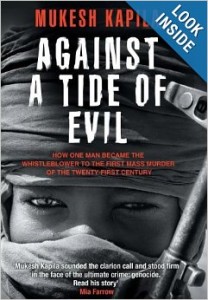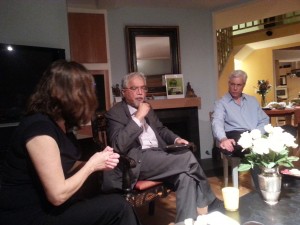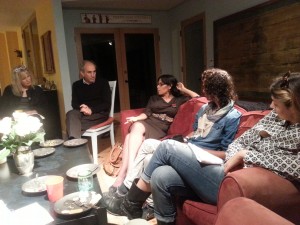Aid Still Required had the distinct honor of welcoming Mukesh Kapila to speak with Aid Still Required about the history of Sudan generally and, more specifically, the current state of Darfur and the people affected by the mass atrocities that continue there. Given the demand for Mukesh’s time, it was amazing to have him join us for a few hours in such an intimate setting. Mukesh also spoke about his book, Against a Tide of Evil that details the accounts of his role as the “whistleblower to the first mass  murder of the 21st Century.” Joining Mukesh was Naama Haviv of Jewish World Watch (JWW). JWW had presented Mukesh with the “I Witness Award” earlier in the day and was hosting him here in Los Angeles.
murder of the 21st Century.” Joining Mukesh was Naama Haviv of Jewish World Watch (JWW). JWW had presented Mukesh with the “I Witness Award” earlier in the day and was hosting him here in Los Angeles.
A little background–Mukesh started his professional career as a physician, but realized that he could make a bigger difference working to affect the policies that made people vulnerable in the first place. Entering civic life, he was a member of one of the first British teams to witness the aftermath of the Rwandan genocide in 1994 and afterwards became the Deputy Director of the National UK Aids Program. Subsequently, he was appointed Head of Conflict and Humanitarian Affairs in the UK before becoming Special Adviser in Afghanistan first to the secretary general of the United Nations and then to the High Commissioner for Human Rights. From there, Mukesh took on the role of UN Development Program Representative to the Sudan where he witnessed what amounted to genocide there.

Knowing that global pressure was the only thing that could put pressure on Khartoum to end the atrocities in Sudan, Mukesh became one of the preeminent voices for the people of Darfur and brought the details of the genocide to the world.
Clearly, Mukesh has already led a very distinguished and accomplished life and the list of awards for which he has been recognized for this work is long. That being said, Mukesh is not stopping in her pursuit to bring the plight of the Darfur people to the world. At Aid Still Required, it is our mission to shift the paradigm of humanitarian relief to include a more long range vision of redevelopment after a disaster be it environmental or human related. We know that when the spotlight of the media has moved on from such disasters, the world’s attention and it’s support does too. This is clearly the case in Sudan where the genocide began over ten years ago. When South Sudan gained its independence, much of the world thought that the long and terrible atrocities had reached its culmination. As such, the attention that helped to put pressure on Sudan has passed. Mukesh explained, though, that the situation for Darfuris has not improved and, in many cases, has gotten a lot worse.
There are still hundreds of thousands of people living in refugee camps or internally displaced within Sudan. This means that families have been living in what can only be understood to be open air prisons–they are not permitted to leave, to build permanent structures or farm. They have been robbed of their culture and their way of life. For children, they know no reality other than the confines of the camps and there is no end in sight. Members of the UN are at the behest of the host country (in this case this typically refers to Chad) which means that there is very little opportunity for real oversight and honest reporting of the situation there to the outside world.
Those who are internally displaced are living in constant fear of attack living in the caves of the Nuba Mountains or in hastily built structures to replace those that are bombed and burned on a regular basis. Where communities flourished, there are now expanses of charred wasteland. Children are denied any semblance of an education and many are now down to living on one meal every two or three days. This is unacceptable and the world needs to be reminded of the crimes against humanity that still exist in and around Sudan.
 Aid Still Required
Aid Still Required